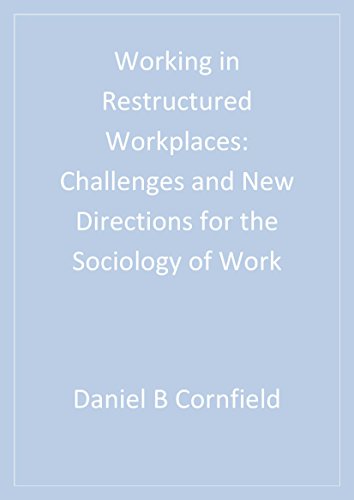Working in Restructured Workplaces Challenges and New Directions for the Sociology of Work
Daniel B. Cornfield (Ph.D., University of Chicago) is Professor of Sociology at Vanderbilt University. His research on labor movements, immigration, organizational careers, and social relations in workplaces and labor markets has appeared in over 40 articles and several books, has been supported by the National Science Foundation, Russell Sage Foundation, UN International Labor Office, Tennessee state government, and Metropolitan Government of Nashville-Davidson County, and has been translated into Korean, Portuguese, and Spanish. A member of the the Sociological Research Association (national honorary society), he is the recipient of the 1993 Outstanding Graduate Teacher Award from Vanderbilt University and the 2000 Excellence in Education Award (Sociology) of the Labor and Employment Relations Association (formerly the Industrial Relations Research Association). He was elected Chair of the Section on Organizations, Occupations, and Work of the American Sociological Association, and appointed Chair of the Department of Sociology at Vanderbilt University, a member of the editorial boards of several U.S., Latin American, and European scholarly journals, and a member of NSF, NIH, and European Union grant review panels. ... Read more Read less
What are the contemporary trends in workplace restructuring and the sociological impact on workers' lives? Around what concepts will work be organized and groups and individuals motivated in their work into the new century? To give you definition and answers to these contemporary questions, the editors of the sociological quarterly, Work and Occupations, assembled Working in Restructured Workplaces. It addresses contradictory influences in contemporary workplace restructuring, its impact on workers' lives, and the direction and nature of future changes in the workplace. This authentic collection of sociological thought and research consists of previous works in Work and Occupations and some commissioned specifically for this book to focus on the nature, causes, and consequences of workplace restructuring. The editors introduce a new concept of workplace restructuring' to broaden your perspective and then assess implications for workers and their lives. The chapters address four major themes: reconfiguring workplace status hierarchies casualization of employment relationships restructuring and worker marginalization comparative labor responses to global restructuring. The last two chapters chart new research agendas on the boundaries and durability of workplace restructuring. ... Read more Read less











